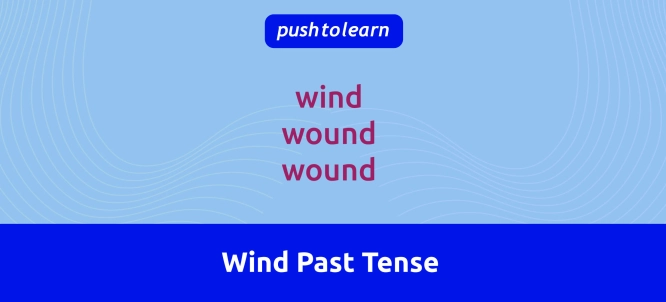by PushtoLearn
Wind Past Tense
Table of Contents
Wind Past Forms - Exercises
These exercises test different forms of the verb WIND and IRREGULAR VERBS
Meaning
The verb "wind" has two primary meanings:
-
To turn or twist something (like winding a clock or twisting a string).
-
To follow a curving or twisting path (like a road that winds through the mountains).
The past tense of "wind" is "wound" (pronounced like "found").

Forms of "wind"
|
Tense |
Form |
Example Sentence |
|
Present |
wind |
"I wind the clock every morning." |
|
Past |
wound |
"She wound the string tightly around the spool." |
|
Past Participle |
wound |
"They have wound the cable neatly." |
|
Present Participle |
winding |
"The path is winding through the forest." |
Examples of "Wind" in Sentences
Past Tense (wound):
1. Referring to twisting or turning:
-
"I wound the handle of the toy to make it move."
-
"She wound the thread carefully onto the bobbin."
-
"They wound the rope tightly around the pole."
2. Referring to following a curving path:
-
"The river wound its way through the valley."
-
"The road wound around the mountain for miles."
-
"The trail wound through the dense jungle."
Past Participle (wound):
1. Referring to twisting or turning:
-
"He has wound the wires to keep them organized."
-
"The spring had been wound too tightly and snapped."
-
"They have wound the clock every day for years."
2. Referring to following a curving path:
-
"The highway has wound through this region for decades."
-
"The stream had wound its way to the ocean."
-
"The route has wound through several small towns."
Common Mistakes with "Wind"
1. Using "winded" instead of "wound" for twisting or curving paths:
Learners sometimes confuse "winded" (which means out of breath) with "wound" (the correct past tense of "wind").
-
Incorrect: "She winded the thread around the spool."
-
Correct: "She wound the thread around the spool."
-
Incorrect: "The road winded through the mountains."
-
Correct: "The road wound through the mountains."
2. Confusing "wind" (to twist) with "wind" (moving air):
"Wind" as a noun or verb related to moving air (e.g., "The wind blows hard") is unrelated to "wind" (to twist or follow a path). Be sure to use the correct context.
-
Incorrect: "The fan wound through the air."
-
Correct: "The fan moved through the air."
3. Mispronouncing "wound":
The past tense "wound" should rhyme with "found," not "wound" (an injury).
Explore the use of irregular verbs in the Past Simple tense with this lesson for additional practice. Don’t forget to check out other Grammar Exercises A1 for more quizzes. Examples of irregular verbs include Dive, Fly, and Bring.
FAQ
What is the past tense of "wind"?
The past tense of "wind" is "wound."
How do I use "wound" in a sentence?
Use "wound" to describe a twisting action or curving motion that happened in the past.
-
Example (twisting): "He wound the cable around the reel."
-
Example (curving): "The road wound through the hills."
What is the past participle of "wind"?
The past participle of "wind" is also "wound."
Example: "The spring has been wound tightly."
Is "winded" ever correct?
Yes, but "winded" means out of breath, not the past tense of "wind."
Example: "After running up the hill, I felt winded."
Can "wind" have multiple meanings?
Yes! "Wind" can refer to twisting something, following a curving path, or moving air. Context will determine its meaning.

